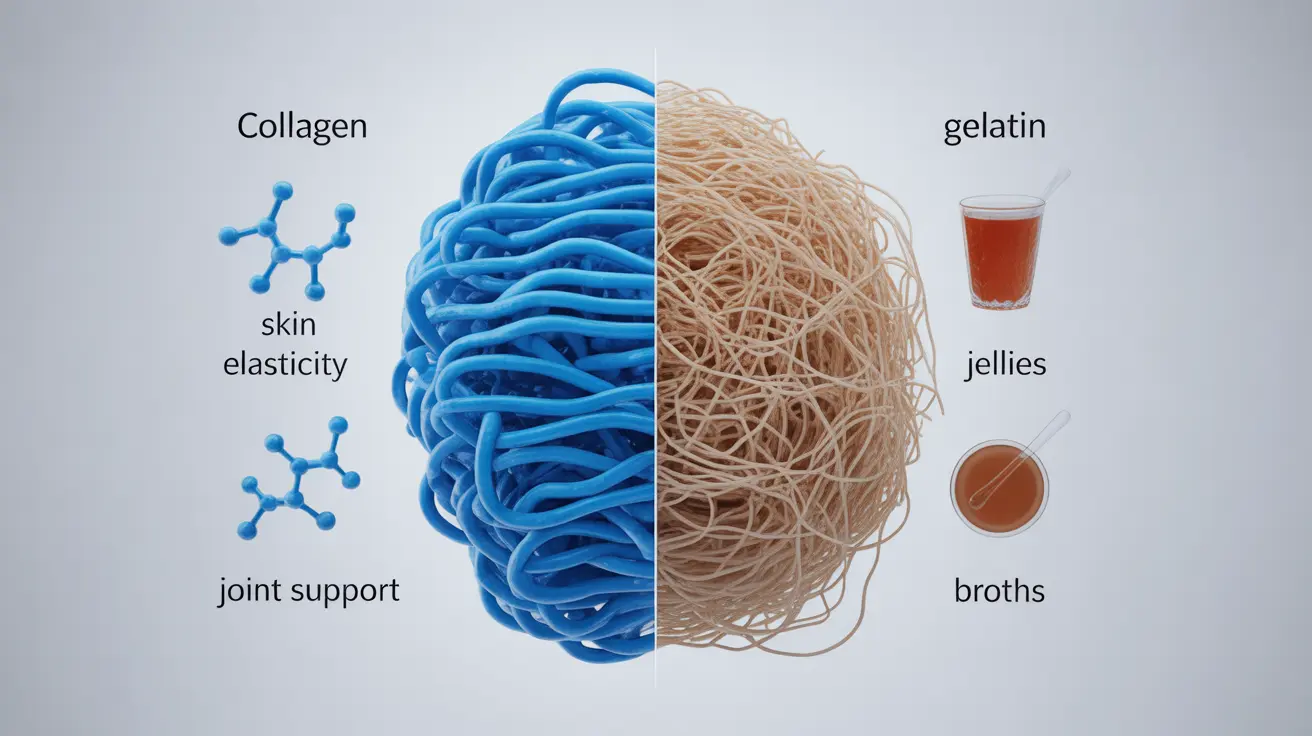When it comes to supporting skin health, joint function, and gut wellness, both collagen and gelatin have gained significant attention in the health and wellness community. While these proteins are closely related, they have distinct characteristics that affect their uses and benefits. Understanding the key differences between collagen and gelatin can help you make informed decisions about which supplement might be right for you.
In this comprehensive guide, we'll explore the unique properties of collagen and gelatin, their health benefits, and how to use them effectively in both supplementation and cooking.
Understanding the Basics: Collagen and Gelatin Explained
Collagen is the most abundant protein in the human body, serving as a crucial building block for skin, bones, muscles, and connective tissues. Gelatin, on the other hand, is derived from collagen through a process called partial hydrolysis, which breaks down the protein's structure using heat and water.
Structure and Composition
Collagen exists in its natural form as a triple helix structure, composed of three amino acid chains. When collagen undergoes processing to create gelatin, this structure is partially broken down, resulting in shorter protein chains that retain many of the same amino acids but behave differently in terms of solubility and practical applications.
Health Benefits and Applications
Collagen Benefits
Collagen supplements, particularly in the form of hydrolyzed collagen peptides, offer several advantages:
- Easily dissolved in both hot and cold liquids
- Higher bioavailability
- Better absorption in the digestive system
- Convenient for daily supplementation
- Versatile use in beverages and foods
Gelatin Benefits
Gelatin provides unique benefits that make it valuable for both health and culinary purposes:
- Excellent for gut health and digestion
- Natural thickening agent in cooking
- Supports joint health
- Promotes skin elasticity
- Helps create structure in foods
Absorption and Digestion
The key difference between collagen and gelatin lies in their digestibility and absorption rates. Collagen peptides are broken down into smaller molecules, making them more readily absorbed by the body. Gelatin, while still beneficial, requires more digestive work to break down its longer protein chains.
Practical Applications in Diet and Supplementation
Collagen Uses
Collagen supplements can be incorporated into your daily routine through:
- Morning coffee or tea
- Smoothies
- Protein shakes
- Baked goods
- Plain water
Gelatin Uses
Gelatin shines in various culinary applications:
- Homemade gummies
- Jellies and mousses
- Soups and broths
- Desserts
- Natural thickener for sauces
Frequently Asked Questions
1. What is the difference between collagen and gelatin in terms of structure and how they work in the body? Collagen has a complete triple helix structure, while gelatin is partially broken down collagen. Collagen typically exists as peptides that are more easily absorbed, while gelatin requires more digestive processing but offers unique gelling properties.
2. Which is better for skin, joint, and gut health: collagen supplements or gelatin? Both offer similar health benefits, but collagen supplements are generally more easily absorbed. However, gelatin may have additional benefits for gut health due to its unique protein structure. The choice often depends on your specific needs and how you plan to use the product.
3. Can collagen and gelatin be used interchangeably in cooking and nutritional supplements? No, they cannot be used interchangeably. Collagen peptides dissolve in both hot and cold liquids without gelling, while gelatin creates a gel-like structure when cooled. Each has specific applications in cooking and supplementation.
4. How do collagen peptides and gelatin differ in digestion and absorption? Collagen peptides are more readily absorbed due to their smaller molecular size and pre-broken protein chains. Gelatin requires more digestive processing but still provides similar amino acids once broken down.
5. What are the best ways to use collagen and gelatin for health benefits and cooking purposes? Use collagen peptides in beverages, smoothies, and baked goods for easy supplementation. Reserve gelatin for recipes requiring thickening or gelling properties, such as homemade gummies, jellies, and thickened sauces.




